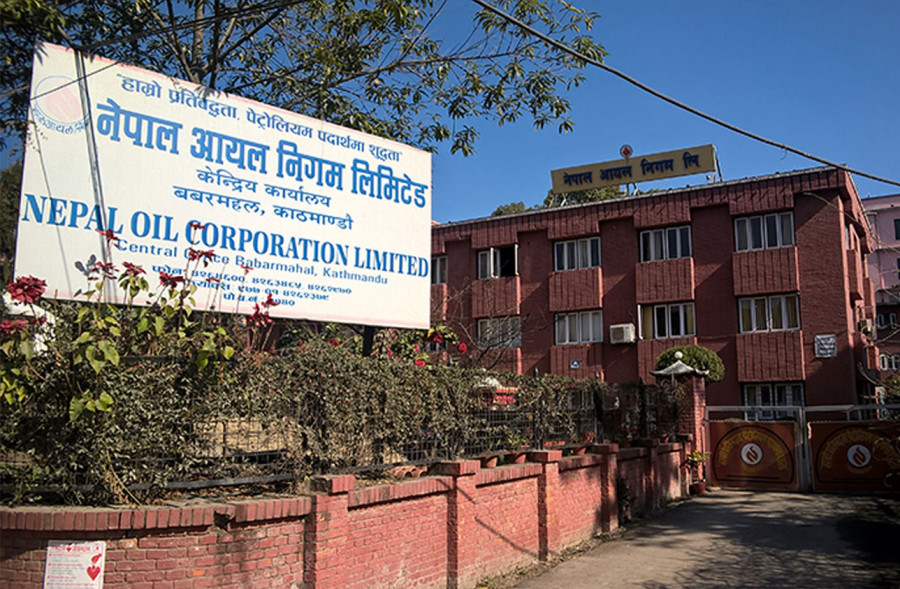National
Nepal Oil Corporation reluctant to make fuel cheaper despite falling global prices
The state-owned oil monopoly says it cannot afford to slash prices given the losses it continues to incur owing to high taxes.
Prithvi Man Shrestha
Nepal Oil Corporation on Wednesday said that it is not in a position to reduce the prices of petroleum products although international oil prices have fallen over the last one month.
After the government was criticised for not revising the fuel prices despite oil becoming cheaper in the international market, the Nepal Corporation (NOC) defended itself, saying it is still suffering losses in fuel sales due to high taxes.
In a statement on Wednesday, the state-owned oil monopoly said despite the cost price of oil getting cheaper, the corporation will still suffer a monthly loss of Rs1.27 billion even if fuel prices are kept unchanged.
“That’s why the NOC is in a compulsion to keep the existing prices unchanged,” it added.
The corporation which used to adjust the petroleum prices based on the price list sent by the supplier Indian Oil Corporation every fortnight has kept the price unchanged despite receiving a reduced price list for two consecutive fortnights.
On August 1, the Indian Oil Corporation (IOC) sent a revised list with reduced prices for all petroleum products.
The IOC has cut petrol price by Rs16.97 per litre, diesel price by around Rs12.55 per litre and cooking gas by Rs82.85 per cylinder, according to the NOC.
As per the new price list sent by the IOC, the oil monopoly will make a profit of around Rs2.78 per litre in petrol.
But it will continue to incur a loss of Rs9.37 per litre in diesel and Rs499.57 per cylinder in cooking gas, the NOC said in the statement. There is a marginal profit in kerosene and aviation fuel, according to the NOC.
Binitmani Upadhyay, spokesperson of the NOC, told the Post that due to high consumption of diesel compared to petrol, the NOC’s losses have continued.
“Diesel sells around 2.5 times more than petrol,” he said. “Another major loss maker is the cooking gas.”
Besides continued losses, the NOC has also pointed out the outstanding dues to be paid to the Indian supplier as its justification for not revising the fuel prices.
“The outstanding due totalling Rs23 billion is yet to be paid even after making certain payments including Rs7 billion that was provided as a loan by the government, another Rs3 billion that we borrowed from the Rastriya Banijya Bank and the amount collected by the NOC from the market,” the NOC statement reads.
The oil monopoly had paid around Rs17 billion to the IOC in mid-July to reduce its outstanding dues of over Rs30 billion. Since then, dues have piled up along with the supply of fuel from the IOC, according to Upadhyay.
The NOC’s reluctance to slash fuel prices has been criticised in parliament, streets and the media as fuel prices have driven inflation. Nepal’s inflation reached a 70-month high in June as the year-on-year inflation reached 8.56 percent in the 11th month of last fiscal year that ended in mid-July, according to the Nepal Rastra Bank.
Economists say that rising inflation is directly connected to fuel price hike.
“You cannot compare price rise in petroleum products and other products,” said economist Keshav Acharya. “Rise in petroleum products does have a spiral effect on the prices of other products. It increases transportation cost and production cost of agricultural and manufacturing leading to overall price rise of virtually everything.”
Through the budget for the current fiscal year 2022-23, the government has targeted to tame the inflation at seven percent. The Nepal Rastra Bank has also introduced a tighter monetary policy with the aim of controlling the inflation as it seeks to dampen demands by slowing the growth of credit and money supply in the market.
On July 3, the NOC had made an upward revision in the prices of petrol, diesel and aviation fuel (domestic) to Rs181 per litre, Rs172 per litre and Rs190 per litre from Rs179 per litre, Rs163 per litre and Rs185 per litres, respectively.
Since then, the IOC has sent revised price lists twice by decreasing the prices. But the state-owned oil monopoly has shown no interest in reducing fuel prices.
“The government must be clear whether its priority is to collect revenue or provide relief to the people from rising inflation,” said Acharya, who is also former executive director of the Nepal Rastra Bank. “If I were in the policy making body, I would prioritise controlling inflation over collecting revenue.”
Fuel prices have come down in the international market in recent weeks amid fears of recession as factory activities slow down.
Brent crude price stood at $100.34 a barrel on Tuesday, a drop from around $140 per barrel in March earlier this year. In July 2008, oil price had set an all time high record of $147.50 per barrel.
Surveys showed on Monday that factories across the United States, Europe and Asia struggled for momentum in July as flagging global demand and China's strict Covid-19 restrictions slowed production.
Also, after the government failed to honour its commitment to make downward adjustments to taxes on fuel, the state-owned oil monopoly has shown reluctance to reduce fuel prices.
On June 25, the NOC had decreased the petrol price by Rs20 per litre and diesel price by Rs29 per litre as per a government decision to adjust taxes.
But the government has not honoured its commitment so far.
“We continue to pay all the taxes as usual,” said Upadhyay.




 18.12°C Kathmandu
18.12°C Kathmandu















